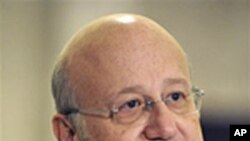Lebanon has a new prime minister who came to power at the end of January with a majority of votes from legislators in the country’s Hezbollah-led opposition. Questions remain about the composition of Najib Mikati’s Cabinet, and whether it will deviate from the previous government's pro-Western policies, but analysts see no dramatic shifts, at least in the short term.
By all accounts, Najib Mikati is a moderate Sunni Muslim with a Western education and ties to the global business community. But he is also a man brought to power by the votes of parliamentarians allied with Syria and Iran. Some observers worry that he will reverse the pro-Western path Lebanon has taken since Syrian troops withdrew from the country in 2005 and return to one set by Damascus and even Tehran.
A political science professor at Lebanese American University, Bassel Salloukh, says such fears of Hezbollah’s influence in Mr. Mikati’s government are overblown.
“I think whether coming from Israel or from Washington, this rhetoric about Hezbollah's hegemony and so on is exaggerated. Hezbollah’s military position in the country does not change with Mikati's government. I think part of this is just an attempt to put pressure on Hezbollah and its allies in Lebanon,” Salloukh said.
Paul Salem, director of the Carnegie Endowment’s Middle East Center in Beirut, notes that Hezbollah had veto power in the previous government. He says now that Hezbollah has become part of the majority it is more aware of sensitivities surrounding it and will probably not have any of its members in the new Cabinet.
“Hezbollah is feeling more secure that they have a government which is not hostile to them, so they feel less the need to be confrontational or break dramatically with the tribunal and so on, now that they have a government which they feel is not out to get them,” he said.
The tribunal is the U.N.-backed Special Tribunal for Lebanon, investigating the 2005 assassination of former Prime Minister Rafik Hariri. Leaks from the court in The Hague have indicated that members of Hezbollah may be implicated in Mr. Hariri’s murder. Hezbollah, in turn, has demanded that Lebanon cease all cooperation with the tribunal. It was this disagreement with Prime Minister Saad Hariri that led Hezbollah to withdraw its ministers from his Cabinet, forcing his government to collapse.
Professor Salloukh says Lebanon’s foreign policy is generally more reactive than pro-active, and subject to the situation in the complicated neighborhood where it lives.
“In terms of Lebanon's foreign policy, alas, Lebanon today is such a weak country that it really does not have pro-active foreign policy. It tries to maneuver through different foreign-policy challenges," Salloukh said. "But as such itself does not really have a kind of pro-active foreign policy. Lebanon’s foreign policy for the foreseeable future will remain a consequence of the geopolitical struggles among its neighbors and regional and international actors.”
Those neighbors include Syria, which had a military presence in the country for 30 years, ending only in 2005; and Israel, with which Lebanon is in an official state of war.
Paul Salem says Israel and Hezbollah may be on a collision course, but it will not be brought to a head over the Shi'ite group’s possible participation or influence in the new government.
“It has much more to do with the timetable between Israel and Iran over the nuclear issue, and Israel’s perception of threat along that axis,” he said.
On the international front, Prime Minister Mikati has said that he wants good relations with the United States. But Secretary of State Hillary Clinton said recently that “a Hezbollah-controlled government would clearly have an impact” on Washington’s relationship with Beirut.
Washington lists Hezbollah as a terrorist organization, and U.S. officials have said its growing influence could impact the nearly $250 million in annual economic and military aid Washington gives Lebanon.
But overall, observers say that for now Beirut will most likely maintain the status quo in its international relations, avoiding decisions that could move the country in a direction that would isolate it internationally, see it sanctioned or lose international aid.
“If a Hezbollah-backed government ratchets up the control in serious ways, we may see a negative reaction abroad regarding aid, regarding assistance, especially to the Lebanese Armed Forces,” said Mohammad Chattah, a senior adviser to former Prime Minister Saad Hariri. “On the other hand, frankly, I do not think that is what we are going to see in the government. I think having brought Prime Minister Mikati to power as prime minister, I think at least for the time being, there will be an attempt to show continuation of the status quo on these matters.”
Paul Salem of Carnegie agrees that trend will extend through the near term, in part because of the uprising in Egypt.
“The balance of power in the region is shifting, not in favor of sort of U.S. allies, and that also affects the balance of power in Lebanon,” he said. “But probably without dramatic effect, because the Lebanese government will try to not break relations with any major players in the region or the world.”
Lebanese American University Professor Bassel Salloukh sums it up, saying there has been a geopolitical reshuffling of the deck, and observers will now have to wait to see if that has changed the international and regional contest over Lebanon.




